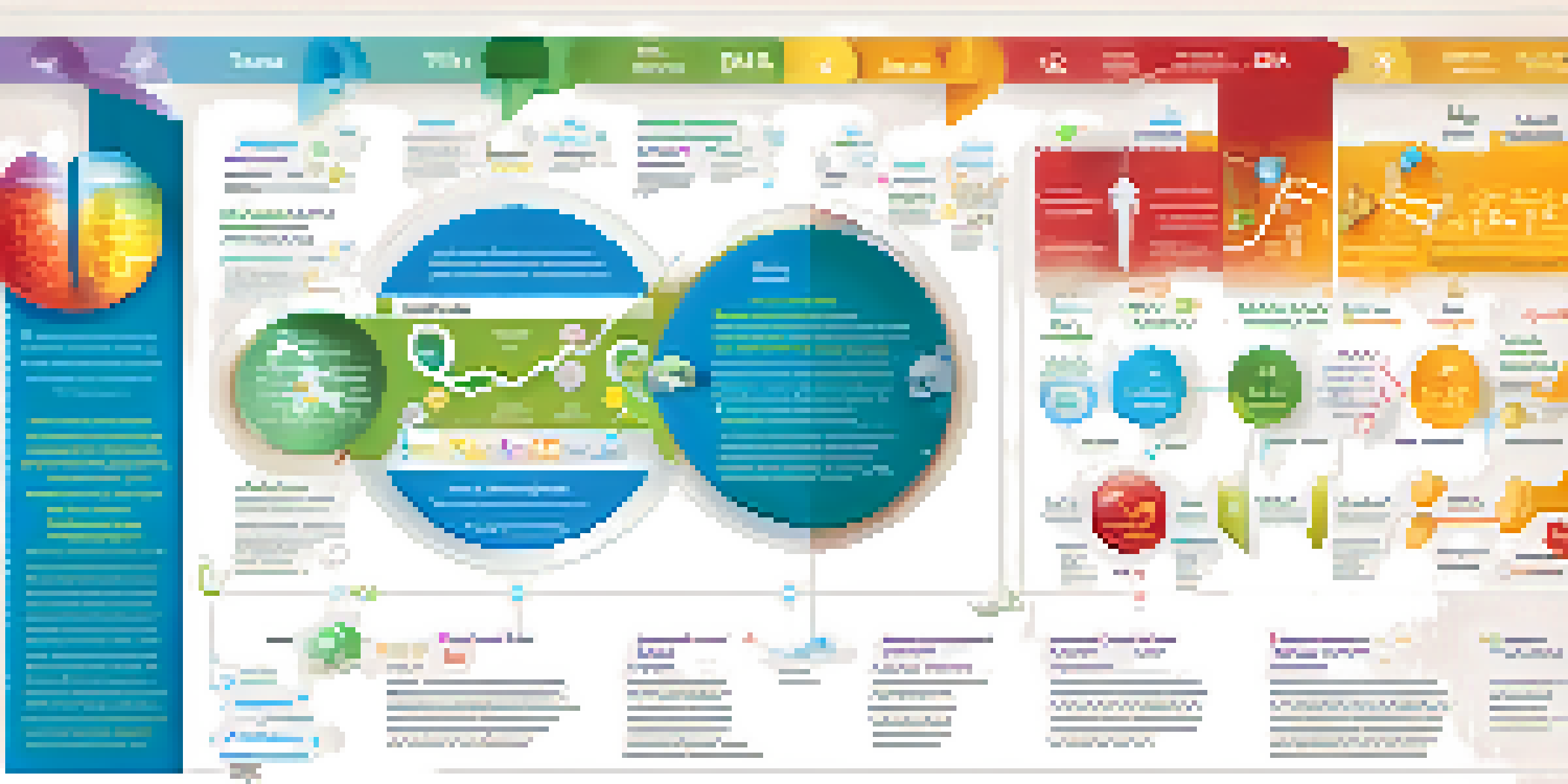The Role of Genetic Testing in Modern Disease Management

Understanding Genetic Testing and Its Importance
Genetic testing refers to the analysis of genes, chromosomes, or proteins to identify mutations that may lead to diseases. This process can be pivotal in diagnosing hereditary conditions, allowing individuals to understand their health risks better. By uncovering genetic predispositions, patients can take proactive steps in managing their health, which is a game changer in modern medicine.
Genetic testing is a powerful tool that can provide insights into health risks and guide personal health decisions.
Imagine having a weather forecast for your health: genetic testing acts like that forecast, giving insights into potential storms ahead. For instance, knowing one has a higher risk for breast cancer can lead to earlier screenings or preventive measures. This foresight empowers individuals to make informed choices about their health, enhancing their overall quality of life.
Moreover, understanding the role of genetic testing can help demystify what might feel like an overwhelming process. It’s not just about identifying diseases; it’s about tailoring management strategies that are as unique as each individual. In a world where one-size-fits-all solutions are becoming less effective, genetic testing offers a more personalized approach.
How Genetic Testing Affects Disease Diagnosis
One of the most significant impacts of genetic testing is its ability to improve disease diagnosis. Traditional methods often rely on observable symptoms, which can be vague or misleading. However, genetic tests can pinpoint the underlying genetic causes, providing clarity and accuracy in diagnosing conditions that often go undetected.

For example, genetic testing can reveal certain types of rare diseases that wouldn’t show up in standard diagnostic tests. This is especially crucial for conditions like cystic fibrosis or muscular dystrophy, where early diagnosis can dramatically alter treatment plans and outcomes. By identifying these issues early, healthcare providers can implement effective interventions sooner.
Genetic Testing Enhances Diagnosis
Genetic testing provides precise insights into diseases, improving diagnosis and enabling earlier interventions.
In essence, genetic testing acts as a powerful diagnostic tool that adds a layer of precision to healthcare. It transforms the way doctors approach patient care, moving from a reactive to a proactive stance. This shift not only enhances the patient experience but also improves long-term health outcomes.
The Role of Genetic Testing in Personalized Medicine
Personalized medicine is about tailoring treatment based on individual characteristics, and genetic testing plays a crucial role in this evolution. By understanding a patient's genetic makeup, healthcare providers can select therapies that are more likely to be effective. This level of customization can lead to better results and fewer side effects.
The future of medicine will be about personalizing care based on genetic information, allowing for more targeted and effective treatments.
Take cancer treatment as a prime example: genetic testing can help identify which therapies will work best for specific tumor types. This means that instead of a broad treatment plan, patients receive targeted therapy that has a higher chance of success. It’s like choosing the right tool for the job; the right medication can make all the difference.
Furthermore, personalized medicine can also help in avoiding treatments that could cause adverse reactions. By analyzing genetic markers, doctors can predict how a patient might respond to certain medications. This not only enhances the safety of treatment protocols but also fosters a deeper trust between patients and healthcare providers.
Genetic Testing and Family Planning Decisions
Genetic testing has significant implications for family planning, allowing prospective parents to make informed choices about their future. By undergoing testing, couples can determine if they carry genes for hereditary conditions, such as Tay-Sachs disease or sickle cell anemia. This knowledge can guide their decisions on whether to conceive naturally or explore options like IVF with genetic screening.
Imagine the peace of mind that comes with knowing your child’s risk for certain genetic disorders before they are born. This foresight can empower parents to make proactive choices, such as early interventions or lifestyle adjustments, that could positively impact their child’s health. It’s about giving families a chance to prepare for what lies ahead.
Personalized Medicine Benefits
By tailoring treatments based on genetic makeup, personalized medicine increases treatment effectiveness and reduces side effects.
Additionally, understanding genetic risks can strengthen family bonds, as it opens up conversations about health history and shared experiences. It encourages openness about genetic conditions that may affect family members, fostering a supportive environment where everyone can navigate their health journeys together.
Ethical Considerations of Genetic Testing
While genetic testing offers numerous benefits, it also raises important ethical questions. Issues such as privacy, consent, and the potential for discrimination are at the forefront of discussions surrounding genetic testing. Patients must be informed about how their genetic information will be used and who will have access to it.
For example, concerns about insurance companies using genetic information to deny coverage can create barriers for individuals seeking testing. This highlights the need for stringent regulations that protect individuals from potential misuse of their genetic data. It’s essential that as we embrace the power of genetic testing, we also safeguard the rights of those undergoing testing.
Moreover, the implications of genetic testing can extend beyond the individual, affecting family members who may share similar genetic traits. This interconnectedness emphasizes the importance of ethical considerations, ensuring that genetic testing is used responsibly and compassionately. As we navigate this evolving landscape, fostering a culture of ethical awareness is crucial.
The Future of Genetic Testing in Disease Management
The future of genetic testing holds exciting possibilities for disease management. With advancements in technology, we can expect genetic tests to become more accessible and affordable, empowering more individuals to take charge of their health. As research continues to uncover new genetic markers and associations, the potential for precision medicine will only expand.
Imagine a world where routine health screenings include genetic assessments, allowing for early detection and prevention of diseases before they manifest. This proactive approach could revolutionize how we handle health issues, moving the focus from treatment to prevention. It’s an inspiring vision that could lead to healthier populations and reduced healthcare costs.
Ethical Issues in Genetic Testing
While beneficial, genetic testing raises ethical concerns regarding privacy, consent, and potential discrimination.
Moreover, the integration of artificial intelligence with genetic testing could enhance data analysis, providing deeper insights into complex genetic interactions. This synergy could pave the way for breakthroughs in understanding multifactorial diseases, such as diabetes and heart disease, ultimately improving treatment strategies. The horizon for genetic testing is vast and full of potential.
Navigating Genetic Testing: Resources and Support
Navigating the world of genetic testing can be overwhelming, but there are plenty of resources available to guide individuals through the process. From genetic counselors to informative websites, support is readily accessible. These professionals can help interpret test results and provide personalized recommendations based on individual circumstances.
Consider reaching out to organizations like the National Society of Genetic Counselors, which offers valuable information on finding qualified counselors. These experts can help clarify any doubts, ensuring that individuals make informed decisions about testing and subsequent steps. It’s like having a knowledgeable friend in your corner as you navigate this complex landscape.

Additionally, online platforms and support groups can provide community and shared experiences, making the journey feel less isolating. Engaging with others who have undergone similar tests can offer insights and encouragement. Remember, you don’t have to face this journey alone; support is just a click away.